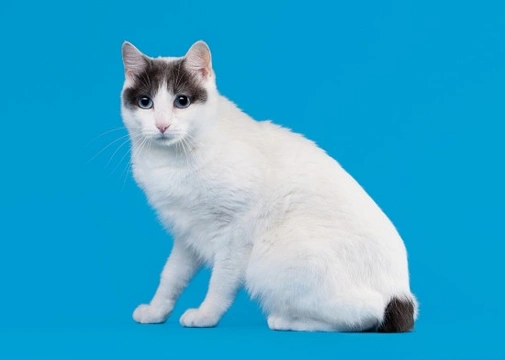
The Japanese Bobtail a Cat with Few Health Issues
The charming Japanese Bobtail is known to be a pretty intelligent feline and one that boasts a long lifespan which can be anything up to 15 years plus. The breed is also known to be very people-friendly loving to spend as much time with their owners as they can. Being such talkative characters, they are a real pleasure to be around which is why they make such a wonderful choice as a family pet.
Although considered to be one of the healthier breeds around, the Japanese Bobtail like so many other pure bred cats may develop certain health conditions which are definitely worth knowing about, especially if you are thinking about sharing your home with one of them.
Below is a list of genetic health issues more commonly seen in the breed together with a couple of acquired conditions which are worth making a note of so that if your cat does develop any symptoms, you would pick up on them sooner rather than later.
Hypothyroidism
The Japanese Bobtail is prone to a condition called Hypothyroidism which negatively affects their thyroid function. As such not enough of the thyroid hormone is produced by the body which in turn negatively impacts a cat's metabolism. Symptoms to watch out for include the following:
- Hair loss
- A gain in weight
- Loss of muscle tone
- Lethargy
- Occasionally, a cat may also suffer from heart problems
A vet would need to carry out several blood tests to make a correct diagnosis and if the results come back positive, the condition would need to be managed with the right sort of medication for the rest of the cat's life and regular trips to the vet would be a must.
Diabetes
These lovely cats are also known to suffer from diabetes which is a condition where the body cannot store enough insulin. Once diagnosed, the condition can be managed with the right sort of medication, but it's an ongoing health disorder and one that will need to be treated for the rest of the cat's life much as it does in humans. As such regular health checks at the vet are essential so the conditioned can be monitored and assessed.
Kidney Failure
The breed is known to suffer from kidney failure which can be bought on by several underlying conditions. If you suspect your Japanese Bobtail might have a renal infection, you would need to get them to a vet as soon as possible so tests can be carried out to establish if this is indeed the case. A prompt diagnosis and treatment is essential because the earlier a renal condition is caught, the better the outcome tends to be for the cat.
Obesity
Obesity incats is on the increase and with it comes a whole host of other acquired feline health issues which can seriously impact a cat's life and shorten their lifespan considerably. All breeds including the charming Japanese Bobtail are susceptible when it comes to weight issues which is why it's so important to keep a close eye on how much a cat is eating.
If you notice your feline friend is putting on weight, you should reduce the amount of food you offer them in each meal and feed them smaller portions more often during the day. It might be worth investing in an automatic feeder and one that dishes out wet cat food rather than dry food. However, it is always a good idea to seek veterinary advice before putting a cat on a diet because their weight gain could be due to some other underlying health issue.
Spina Befida
Although, these cute cats have a characteristic bobbed tail, they are no more prone to suffer from spina befida than a long tailed cat. This is because the mutated gene responsible for this trait only affects few of the vertebrae in the cat's spine which is good news because this is a condition that generally has a pretty bleak prognosis.
Contacting a Reputable Breeder is Essential
Although the breed is known to be one of the healthier cats around, it's still really important to contact a reputable breeder and one who only uses healthy cats in a breeding programme. However, you have to bear in mind that many genes responsible for genetic and inherited health disorders seen in cats and other animals, are capable of skipping several generations. In short, getting a Japanese Bobtail from a reputable breeder effectively reduces the chances of your cat developing an hereditary health issue, but it does not offer any guarantees!



